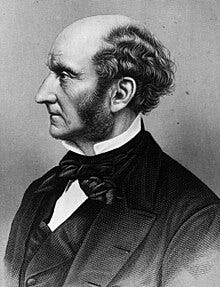After Prof. Thomas's course on Ancient Greek and Roman philosophy, I was entering this course skeptical (if not outright hostile) to Utilitarianism. After reading the first two chapters of Mill's "Utilitarianism," I am in a much more aporetic, ambivalent state. As an aside, Mill is a wonderfully entertaining, conversational writer. As a philosopher, he anticipates and adeptly counters the most common objections to Utilitarianism—many of which I thought were intractable. What follows are some challenges to which I believe Mill responds adroitly.
To begin, Mill admits straightforwardly that choosing pleasure as the ultimate end is a stipulation: "questions of ultimate ends are not amenable to direct proof." Fair enough! Moreover, I find his shot at Kant, deontologist par excellence, quite compelling: "All he shows is that the consequences of [immoral rules of conduct] universal adoption would be such as no one would choose to incur." Mill is accusing Kant of being, at bottom, a consequentialist since the proof of his first principle is located in the counterfactual effects of its practice.
In the second chapter, Mill spills much ink handling those detractors of Utilitarianism that claim it is "a doctrine worthy only of swine." Mill responds to this in two ways, one I find more plausible than the other. First, he argues that, given our nature as rational beings, we are most pleased by those activities which are delightful to this higher part of us. That is, the Greatest Happiness Principle, when adopted by rational creatures, entails delightful rational activity because that is what pleases us the most—by degree. Mill goes on to argue that not only are certain activities more pleasing in degree, but in kind. I am confused by this because it seems to me that Utilitarianism must reduce everything to capital-P Pleasure and capital-P Pain simpliciter. In other, less pedantic terms that I am less likely to use inappropriately, I don't think it makes sense for there to be different kinds of pleasure to a Utilitarian. That said, I do appreciate the test that Mill puts forward: the considered feelings of those who have experienced both sorts of pleasure. Furthermore, I am persuaded by Mill's account of why so many people opt for lower pleasures: "Men often, from infirmity of character, make their election for the nearer good, though they know it to be the less valuable" and that they "lose their high aspirations as they lose their intellectual tastes. . ." A depressing but veridical explanation.
Mill also elucidates the distinction between moral worthiness and right conduct in the Utilitarian framework. That is, in judging the righteousness of actions, it affirms "that the motive has nothing to do with the morality of the action, though much with the worth of the agent" (emphasis added). He continues, "no known ethical standard decides an action to be good or bad because it is done by a good or a bad man." Nor should it; to do so would be to commit either a category mistake or the ad hominem fallacy (both?). Still, in separating the "worth of the agent" from the righteousness of the action, Mill makes ample room for the reality of right actions "not necessarily indicatin[ing] a virtuous character" and "blameable [actions] often proceed[ing] from qualities entitled to praise." Still, Mill (rightly) holds that, in the long run, "the best proof of a good character is good actions."
Mill is also hilarious: "There is no difficulty in proving any ethical standard whatever to work ill, if we supposed universal idiocy to be conjoined with it. . ." In response to those (including myself), who believe Utilitarianism to be practically impracticable for want of a rapid decision-making procedure, Mill has yet another great response: "the corollaries from the principle of utility, like the precepts of every practical art, admit of indefinite improvement, and. . . it is a strange notion that the acknowledgment of a first principle is inconsistent with the admission of secondary ones." He then presents the reader with the apt analogy of how absurd it would be to prevent a traveler from using the heuristics of signposts and landmarks to aid him in reaching his destination. Whenever we solve a kinematic problem, we don't start from first principles and reinvent number theory of scratch; this would be absurd, and I, for one, am certainly incapable of performing this feat. Instead, we use "subordinate principles to apply [the theory]" to issue predictions, solve problems, and, in the ethical realm, choose right actions from wrong ones.
This post is already too long, so will cut it off here. Suffice it to say that I believe Mill successfully refutes most of the challenges to Utilitarianism.



